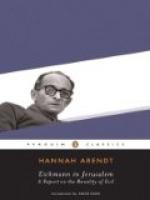|
This section contains 4,513 words (approx. 16 pages at 300 words per page) |

|
SOURCE: "The Politics of Storytelling: Hannah Arendt's Eichmann in Jerusalem," in Southern Humanities Review, Vol. 26, No. 3, Summer, 1992, pp. 201-11.
In the following essay, Siebers analyzes Eichmann in Jerusalem in terms of memory and judgment—qualities largely absent in twentieth-century culture but inherent to storytelling.
Few modern events have stirred the need for recollection and judgment more than the Holocaust. As time and witnesses pass on, however, its memory grows more dim, and legally speaking the atrocities of Nazi anti-Semitism have remained for the most part unjudged. The trial of Adolf Eichmann and the Nuremberg Trials assume great historical significance because they provided concrete occasions for recollecting and judging. The Eichmann trial in particular created a kind of chain reaction of judgment: the judgment of Eichmann gave way to the judgment of anti-Semitism, of Israel, of the Jewish victims, and of the lawyers and the reporters at the trial...
|
This section contains 4,513 words (approx. 16 pages at 300 words per page) |

|


